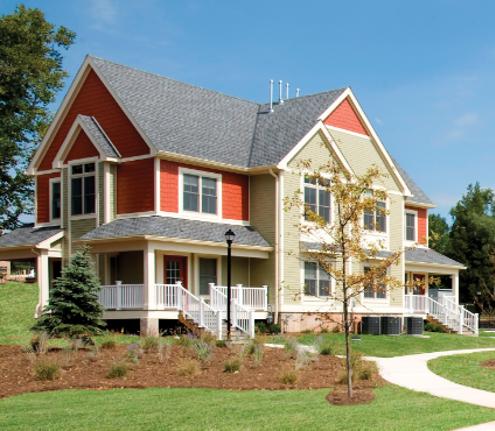A cornerstone in affordable housing since 1987.

At National Equity Fund, everything we do is in service of our mission to create and deliver innovative collaborative financial solutions to expand the creation and preservation of affordable housing. We strive to be a diverse, equitable and inclusive place to work so that our team has the experience and knowledge to effectively support our partners and communities.
Our vision is that all individuals and families across the country have access to stable, safe and affordable housing that provides a foundation for them to reach their full potential.
Our continued commitment to advancing NEF's mission, coupled with our team’s deep expertise, experience, and success in finding new and innovative ways to expand access to affordable housing, drove our company’s results to new heights in 2021. Even more importantly, it allowed us to expand our impact among the families, individuals and communities we serve.
Our strong production throughout 2021 also allowed us to make investments in NEF’s infrastructure and teams that will make us stronger for the future and allow us to expand our impact even further while keeping our financial position steady.
National Equity Fund had our strongest performance ever in 2021, helping our partners create, preserve and expand affordable housing throughout the country.
We raised and deployed a record-breaking $2.2 billion in affordable housing investments, representing a 47% increase over our previous record 2020 production. This also included a record $1.23 billion in Low Income Housing Tax Credit (LIHTC) investments and $930 million in affordable housing Preservation Lending. All told, these investments assisted in providing 13,550 affordable homes for vulnerable communities in 2021.
Other notable activity included our $110 million in committed Opportunity Zone investments and a record workforce housing investment of nearly $40 million. NEF also raised more than $112 million for our Emerging Minority Developer Fund to fight against discrimination and racial injustice, overcome high barriers of LIHTC access and ultimately empower the next generation of Black, Indigenous, People of Color (BIPOC) LIHTC developers.
We'll continue to build on our momentum heading into 2022, as we celebrate 35 years of building affordable homes, strong communities and better lives.
"NEF has come a long way since we closed our first LIHTC deal in Kansas City, Missouri on September 30, 1987.
Today we are approaching our 3000th LIHTC deal and have invested over $20.6 billion in more than 215,500 units. We have properties in 48 states plus Puerto Rico, Washington D.C. and the U.S. Virgin Islands, have relationships with close to 1,150 developers and 250 investors, and 195 funds under management.”
Mark Siranovic, Head of Investor Relations


In 2021, we were able to bring our mission and vision to life in new ways while we continued to deliver strong performances across our production, financial, operational and mission-based outcomes at a scale that was record-breaking for National Equity Fund.
Please contact Alex Denja to request NEF financial documents.
SELECT A STATE FOR MORE INFO
![]()
LIHTC remains our core service offering, and in 2021 we delivered another year of continued growth in LIHTC production – a 16% increase from 2020 and an over 30% increase from 2019. We’ve brought on additional staff and made improvements to our infrastructure to ensure we continue to deliver the best service to both our investors and sponsors.
In this past year, we expanded our portfolio and opened new doors of opportunities with our investors, sponsors and communities. Our diverse investor base continues to provide a solid foundation to build and preserve affordable housing with our top three investors accounting for approximately 40% of total equity raised in 2021. We are proud to have worked with nearly 250 investors, some new and some long established, as our deeply talented teams continue to build and foster lasting relationships.
Additionally, our developer base of nearly 1,150 is just as varied, with our top three partners accounting for approximately 18% of total net equity invested to date. These existing developer relationships combined with a constantly growing sponsor base allow us to work together to maximize impact across the country.
One of our major LIHTC wins, and a unique financing strategy, came through the launch of a $110 million Opportunity Zone Investment Fund in August 2021 to create affordable housing in California. This partnership with Silicon Valley Bank created the opportunity to help increase affordable housing in some of California's high-rent districts including Santa Rosa, Coachella, Los Angeles and San Jose. This deliberate use of Opportunity Zone incentives, twinned with LIHTC, will help to spur economic growth and job creation in low-income communities while providing tax benefits to investors and addressing racial inequity through community investment.

St. Catherine De Vigri Villas is 53 units of affordable housing serving farmworker households earning 30-50 percent AMI in rural Tieton, Washington. It represents the largest multi-family housing development in the city’s history and is the first affordable property in over 30 years. Developer, Catholic Charities Housing Services named this creation after St. Catherine De Vigri, Patron saint of the arts, in honor of the collaboration with the Tieton Arts and Humanities and local artists to engage the residents and the youth in designing two community mosaic art pieces, which have become an iconic feature in the community often showcasing and celebrating its rich agricultural history.

The Apartments at New Market West is a 53,000 square foot, five-story new construction that was built as the second phase of the New Market West development, a 93,000 square foot mixed-use, transit-oriented build located in predominately Black Haddington/Cobbs Creek neighborhood of West Philadelphia. The development is groundbreaking for its major focus on energy efficiency, meeting the Pennsylvania Housing Finance Agency’s (PHFA) threshold for green buildings and achieving a reduced Home Energy Rating System (HERS) index rating.

Hayu Tilxam (translated as many peoples from the Chinook Wawa) provides housing and supportive services targeted to Native Americans in Portland, Oregon, through a unique partnership between Native America Youth and Family Services (NAYA) and Community Development Partners (CDP). It was funded through the city’s inaugural Affordable Housing Bond, which provided the land and over $8 million in gap funds. The developers bring expertise in culturally specific housing development, education and supportive/social services. The building provides a range of until types to serve households earning at or below 60 percent of Area Median Income.

Full Circle Communities and the Ruth Ellis Center partnered on REC (Ruth Ellis on Clairmount) Center, a 43-unit mixed-used permanent supportive housing development in Detroit. REC Center targets youth at risk of homelessness or living with disabilities, as well as LGBTQ+ youth (age 18 to 24) with very low incomes—rents are affordable to those earning at or below 30 percent of the Area Median Income with the help of Project Based Section 8 subsidies. The property is designed to foster communal living and encourage peer support networks and independent living skills. A wellness center offers services largely tailored to serve the LGBTQ+ population.

The closing of Clay Apartments by developer Low Income Housing Institute (LIHI) marks not only the success of this deal, but the promise of innovation, which could lead to more sources of affordable housing in Seattle and beyond. Originally developed by Blueprint Capital, Clay Apartments was intended to be upscale market-rate rental units. However, shifts in the market caused largely by the ongoing COVID-19 pandemic drove the developer to seek buyers for the new construction. Seizing the rare opportunity, LIHI created a plan to acquire the seven-story building for use as affordable housing. Gathering $20.45 million in funds from the Seattle Office of Housing, the Washington State Housing Financing Commission and NEF’s Preservation Fund, LIHI was able to secure the purchase from the original developer.

NEF partnered with Pacific Crest Affordable Housing Partner on a two-phase project to create a total of 96 new affordable apartments in high-rent Bend, Oregon. Phase I one (48 units) was completed in late 2019 and was fully leased by February 2021 with a waitlist of 200+, illustrating the high demand for affordable housing in the expensive resort town. Phase II began construction in 2021 to provide another 48 units of new workforce and family housing options, which are affordable to households earning 30-53 percent of the Area Median Income.
As long-established leaders in Permanent Supportive Housing (PSH), National Equity Fund recognizes that providing affordable housing that includes critical onsite supportive services is the best way to provide our nation's most vulnerable individuals and families the resources to live safe, healthy, and more independent lives. Permanent Supportive Housing improves employment, mental and physical health, and provides residents with greater opportunities to build brighter futures.
“For over three decades, National Equity Fund has been a pioneer in Permanent Supportive Housing. Helping break the cycle of homelessness with tailored solutions allows us to address the root causes of the issue and empower individuals and families to live independently in a supportive environment.”
Debbie Burkart, Managing Director Supportive Housing

One of NEF's outstanding PSH developments that opened in 2021 was West Side Federation for Senior and Supportive Housing (WSFSSH) at West 108th street. Situated in the Upper West Side of Manhattan, WSFSSH at West 108th is a new, two-condo construction building providing housing to individuals experiencing homelessness and low-income families. Of the 199 affordable units, 119 are supportive housing studios for the formerly homeless and 79 are reserved for low-income families.
Through the New York City 15/15 Supportive Housing Initiative, the team set aside 60 units to support seniors with serious mental illness and/or substance abuse disorders. Additionally, through the NYS Empire State Supportive Housing Initiative (ESSHI), 40 units were reserved for seniors with declining health who need mobility support and general assistance. Finally, through the NYC Department of Housing, Preservation and Development’s Homeless Placement Services, 19 units were reserved as general shelter for the population, which is co-located with a 110-bed shelter for seniors called Valley Lodge.
NEF worked with our partners at WSFSSH to create an innovative co-location of supportive housing and shelter, offering a pathway for residents to transition from the Valley Lodge shelter directly into supportive housing at West 108 with shared resources.
MAJOR FUNDERS: Chase Bank; New York City Housing Development Corp.; New York City Department of Housing Preservation and Development; New York State Office of Temporary and Disability Assistance; New York City Department of Homeless Services; Capital One; New York State Energy Research and Development Authority

Milwaukee Soldiers Home is the result of the preservation of six historic Civil War buildings, including a National Historic Landmark, that had fallen into disrepair over the previous decades. Working with the Alexander Company as the developer and a number of other important partners, this beautiful, significant building was rehabilitated, modernized and returned to its original purpose: housing our nation's veterans. Its 101 residences were built for veterans and their families experiencing homelessness and veterans at risk for homelessness.
The story of Milwaukee Soldiers Home's preservation is one of overcoming seemingly insurmountable obstacles through perseverance, teamwork and creativity. Just as it did when it was developed in 1867, the Milwaukee Soldiers Home today is poised to change the face of veteran care by demonstrating what is possible through innovative partnerships that can provide the power to heal. It serves as a shining example of the power of preserving and thoughtfully restoring the historic buildings, which are important to local communities, while honoring their original purpose and creating more safe, stable affordable housing for those who have done so much for our country.

Armed with a vision of reducing vacant lots, reactivating abandoned residential structures and taking on some high commercial vacancy, developer VOA Illinois created a grand plan to make a difference in one urban Chicago neighborhood. Hope Manor Village is comprised of 36 new scattered site infill homes built on 16 lots that VOA purchased from the city for $1 each. Residences are affordable to households earning 15-60 percent of Area Median Income and rental assistance with the Chicago Low‐Income Housing Trust Fund MAUI Program provides subsidies for 10 units.

The Florence Mills Apartments is a mixed-use 74-unit complex developed by Hollywood Community Housing Corporation. The development takes a creative approach to serving the homeless populations by incorporating trauma-informed care principles in the on-site staff’s interaction with residents as well as into the design of the building. It is named after Black singer, dancer, actress and racial rights activist Florence Mills, “The Queen of Happiness,” who died at the young age of 31. Within the complex, Mills’ memory lives on through vibrant murals and music education classes held within the complex.
2021 Affordable Housing Finance Readers’ Choice Finalist, Urban Category

Mason Place is the transformation of an old movie theater into a new 60-unit permanent supportive housing development in Fort Collins, Colorado, that combines beautiful design, livability and sustainability, and comprehensive on-site supportive services to promote self-reliance for formerly unhoused individuals and veterans. The trauma-informed design provides safety, comfort, privacy, and security. The Housing First approach, along with a robust support services plan provides residents with the tools needed to maintain housing. Rents are affordable to households earning at or below 30 percent of the Area Median Income.
2021 Affordable Housing Finance Readers’ Choice Finalist, Special Needs Category.

Sponsored by PathStone Development Corporation, The Eastman Reserve is a 187- unit mixed-income, mixed-use complex that includes 17 total buildings comprised of townhouses, single-family homes and low-rise multifamily apartments in Rochester, New York. It is an example of a transformative development for families in Rochester due to three main components – the duration of time to move from site control to breaking ground, its neighborhood transforming scale, and its proximity to transportation options and employment opportunities. Rents are affordable to households earning between 50-120 percent of the Area Median Income.

Renamed Parkwood Commons when developer Wallick-Hendy Development Co. stepped in to rescue the struggling Pierson Hills development, which was on the brink of closing due to decades of neglect, added 100 refurbished homes targeting families in Peoria, Illinois. The development consists of 50 buildings with two- to five-bedroom homes—64 apartments have three or more bedrooms, filling the needs of larger families and creating a life-changing impact. Parkwood Commons went from being half vacant to a waiting list of 500.

Developed by nonprofit, New Hope Housing, New Hope Housing Dale Carnegie is helping both its residents and its city rebuild—it was one of the first affordable housing developments to break ground in the city after the devastation of Hurricane Harvey in 2017. The Houston development features 170 affordable studio apartments for individuals living on limited or no income, including 100 permanent supportive housing units for people experiencing chronic homelessness.
Preservation Lending is a critical aspect of affordable housing and an important component of our mission. Working with investors to create flexible and efficient products focused on providing bridge financing equity needed to assist our partners with the acquisition and minor recapitalization of projects to maintain long-term affordability for residents. In 2021, our team added almost $1 billion to production, doubling our initial expectations for the year.
Workforce Housing accounted for $46 million of our 2021 production, a big win in a big way. This allowed us to expand opportunities to those in the "missing middle" at 60-120 percent Area Median Income, which is a critical sector of our economy.
One of the biggest success stories of 2021 in the workforce housing segment came through our partnership with Silicon Valley Bank (SVB) and the $110 million Opportunity Zone Fund. Through the Emerald Affordable Housing Ozone Fund, we were able to support four developments in high-cost California cities that provided workforce housing for low-income families. These developments were:
Predevelopment Lending continues to be a critical piece of early financing to assist our partners in development. It covers the costs for tasks that need to be completed before construction closing and can cover a variety of development expenses, from professional fees to acquisition. In 2021, our predevelopment loan volume was $8.65 million.
In the fourth quarter of 2020, we launched the Emerging Minority Developers Fund (EMDF) to help less experienced affordable housing developers, especially those led by people of color, access high-impact financing programs. In 2021, we raised $112M in capital from 11 investors to help the next generation of BIPOC developers who have historically not been given the same access to LIHTC.
View More
In 2021, we were able to invest in our people and resources more than ever before. We know that our people are our biggest differentiator and it remains a priority for us to continue our commitment to strengthening our culture and advancing diversity, equity and inclusion.

Across the board, we worked to enhance and deliver on key areas of our strategic plan that are crucial to a successful work environment, from both an in-office and remote perspective. We prioritized things like strengthening our benefit offerings, recruiting enhancements, COVID-related accommodations and more that foster an inclusive and safe working environment as that’s important for all of us. From rolling out new performance management training to incorporating DiSC assessments into senior leadership practices, we made sure that we were always evolving and challenging ourselves to be better.
In 2021, we filled 41 roles total - 31 external hires and 10 promotions. Of those jobs filled, 46 percent were BIPOC. This speaks volumes to our work to enhance our recruiting process and increase transparency to ensure fair hiring. Overall, this brings additional visibility and guarantees that our teams stay committed to diversity, equity and inclusion in all facets of the business. As a result, NEF’s number of new diverse employees has continued to grow.
Increased representation was also seen through our internship program. In 2021, we rolled our first NEF Ambassador class, bringing in young professionals across the board to gain experience while learning the ins and outs of the affordable housing industry. Our ambassadors and interns know that NEF is a great place to be, just ask Iyana Hooker and Lucas Penido who are now full-time NEF employees.
Many of these enhancements paid off as NEF was named one of 2021 Best and Brightest Companies to Work For® in both Chicago and the nation. This recognition is for organizations committed to excellence in human resources and employee enrichment. Out of 1,5000 nominations across the country, only 184 organizations were national winners. We are extremely proud and honored that our employees assessed us so positively, providing high marks in communication, work-life balance, employee education, diversity, recognition, retention and more. An organization is nothing without a strong foundation of employees and we are honored to have some of the most dedicated, passionate individuals working here at NEF.





